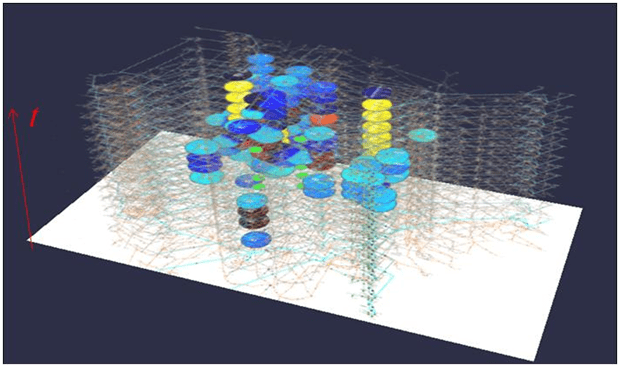Research at the ACES Laboratory is supported by leading Government Agencies and industrial sponsors, and focuses on the key challenges of electricity grids as they evolve towards ultra-resilient, smart, and sustainable systems.
 |
| Fig. A: The emerging electricity grid is characterized by smart devices and subsystems at all scales, communications, and active customers |
ACES focuses on the grid “systems” aspects including:
- Decentralized Grid Control Architectures
- Fast Distrubeted Energy Resources (DER) Hosting Capacity
- Energy Storage and DER Integration and Valuation
- Cyber-Physical Grid Security
- Machine Learning and Artificial Intelligence for the Grid
- Electricity Economics and Business Models
- Home Energy Management
- Microgrids and Grid Resilience
- Bulk Power System Security and Stability
1. Decentralized Control Architecture
Our research on this area have been supported by the Advanced Research Project Agency – Energy (ARPA-E), US Department of Energy, and the military. The main research question to be answered is how can the grid be controlled and operated in a safe manner with potentially billions of smart devices and DERs, and millions of decision makers. The traditional centralized structures are not adequate for many reasons (a centralized management unit represents a single point of failure, massive amount of information would need to be transferred, computational problems become intractable, multiple data privacy concerns arise, etc. ) Thus the new control architecture must be decentralized, and agile. Decentralized simply means that there is more than one decision maker. Many emerging use cases such as microgrids, building to grid, vehicle to grid, X-to-grid, prosumers, etc are use cases of decentralized coordination. We introduce the notion of energy prosumers, develop provable decentralized coordination protocols, and study scalability and grid evolution processes that would support the energy internet. We provide formal theoretical and algorithmic foundations for transactive energy, and provide an architectural vision for ultra-reliable, prosumer-based grids.
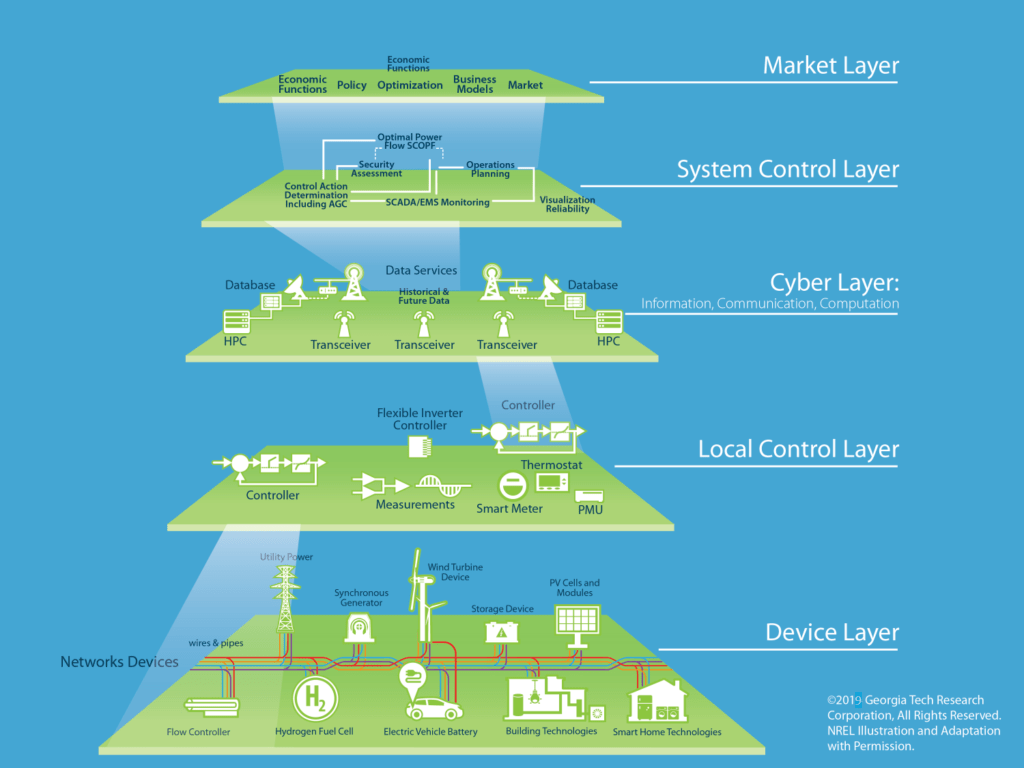 |
Figure 1.1: Layered View of the Grid. The Electricity Grid is a Business-Cyber-Physical System consisting of five layers: Device, Local Control, Cyber, System Control and Market. Each layer provides an abstraction of the lower layer functionality. The layered view provides the basis for a massively scalable grid distributed intelligence control architecture. Each prosumer or energy subsystem can implement the full layered stack locally. |
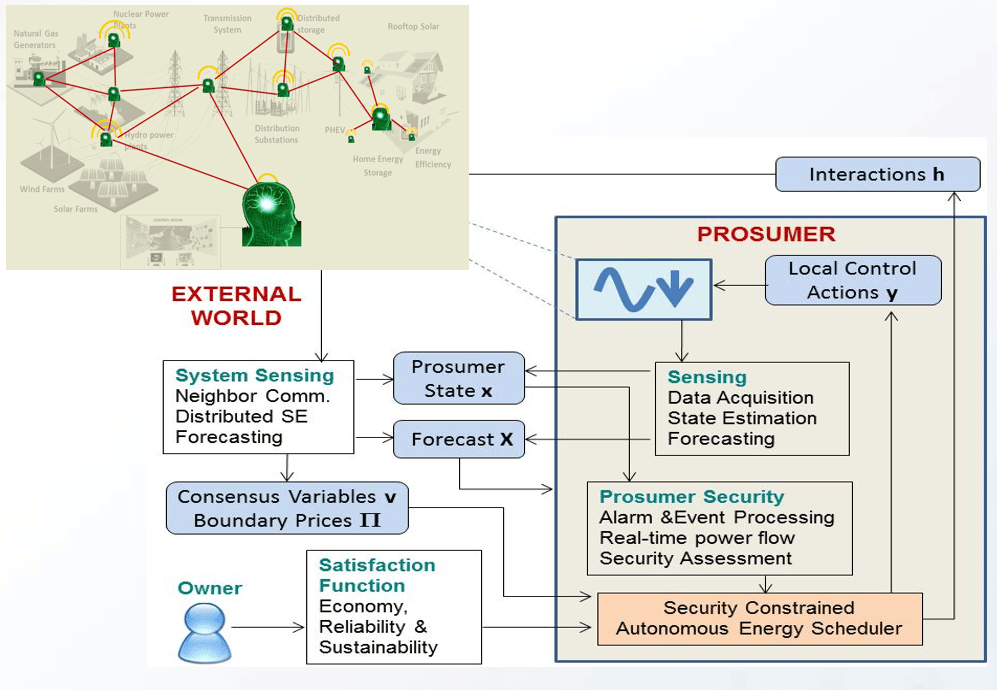 |
Fig 1.2: Energy prosumers are home, buildings, microgrids and other subsystems that can not only consume, but also produce and storage energy. Prosumers are equipped with sensing and actuation and are economically motivated. Prosumers can schedule internal actions but also schedule how they interact with the rest of the grid. They provide abstracted energy, information, and economic services. |
White Paper
- S. Grijalva, M. Costley, “Decentralized Energy Management Architecture for Service-Oriented Cyber-Physical Electric Grids”, Advanced Computational Electricity Systems (ACES), 2016.
- Download white paper
Selected Publications
- N. Ainsworth, S. Grijalva, “A Structure-Preserving Model and Sufficient Condition for Frequency Synchronization of Lossless Droop Inverter-Based AC Networks”, IEEE Transactions on Power Systems, Vol. 28, No. 4, pp. 4310-4319, May 2013.
- M. Nazari, Z. Costello, J. Feizollahi, S. Grijalva, M. Egerstedt, “Distributed Frequency Control of Prosumer-Based Electric Energy Systems”, IEEE Transactions on Power Systems, Vol. 29, No. 6, pp. 2934-2942, March 2014.
- T. Ramachandran, M. Nazari, S. Grijalva, M. Egerstedt, “Overcoming Communication Delay in Distributed Frequency Control”, IEEE Transactions on Power Systems, Vol 31, No. 4, pp. 2965-2973, September 2015.
- M. Feizollahi, S. Ahmed, M. Costley, S. Grijalva, “Large-Scale Decentralized Unit Commitment”, Elsevier International Journal of Electrical Power and Energy Systems, Vol. 73, pp. 97-106, December 2015.
- Y. Seyedi, H. Karimi, S. Grijalva, “Distributed Generation Monitoring for Hierarchical Control Applications in Smart Microgrids”, IEEE Transactions on Smart Grid, Accepted for publication, July, 2016.
- M.U. Qureshi, S. Grijalva, “Enhanced Frequency Response Based on Multiagent Distributed Power Agreement”, IEEE Transactions on Industry Applications 54 (2), 1746-1755, 2018.
- M. Costley, J. Feizollahi, S. Ahmed, S. Grijalva, “A Rolling-Horizon Unit Commitment Framework with Flexible Periodicity”, Elsevier International Journal of Electric Energy, Accepted, October, 2017.
- S. Grijalva, M. Costley, “Prosumer-Based Smart Grid Architecture Enables a Flat, Sustainable Electricity Industry”, IEEE PES Conference on Innovative Smart Grid Technologies (ISGT), Anaheim, California, January 17-19, 2011.
- M.U. Tariq, S. Grijalva, M. Wolf, “Towards a Distributed, Service-Oriented Control Infrastructure for Smart Grid”, ACM/IEEE Second International Conference on Cyber-Physical Systems, Chicago, IL, April 11-14, 2011.
- S. Grijalva, M. Costley, N. Ainsworth, “Prosumer-Based Control Architecture for the Future Electricity Grid”, IEEE Multi-Conference on Systems and Control, Denver, CO, September 28-30, 2011.
- T. Ramachandra, Z. Costello, P. Kingston, S. Grijalva, M. Egerstedt., “Distributed Power Allocation in Prosumer Networks”, 3rd IFAC Workshop on Distributed Estimation and Control in Networked Systems, Santa Barbara, California, September 14-15, 2012.
- N. Ainsworth and S. Grijalva, “A Line Weighted Frequency Droop Controller for Decentralized Enforcement of Transmission Line Power Flow Constraints in Inverter-Based Networks,” IEEE Power Engineering Society General Meeting 2013, Vancouver, BC, Canada, July 21-25, 2013.
89. N. Ainsworth and S. Grijalva, “Design and Quasi-Equilibrium Analysis of a Distributed Frequency-Restoration Controller for Inverter-Based Microgrids”, North American Power Symposium (NAPS) 2013, Manhattan, KS, September 22-24, 2013.
106. M. Costley, M. J. Feizollahi, S. Ahmed, S. Yeo, and S. Grijalva, “Software System for Large-Scale Decentralized Unit Commitment”, INFORMS, San Francisco, November 9, 2014.
2. Fast DER Hosting Capacity
PV Hosting Capacity tries to determine the maximum amount of solar PV that can be safely connected to distribution circuits. Hosting Capacity determination is a key requisite for high-penetration renewable systems that can contribute to sustainability objectives. The determination of hosting capacity requires precise evaluation of the thermal and voltage impacts of solar PV in distribution feeders. Our research focuses on Fast Quasi-Static Time Series (QSTS) Simulation of central and distributed PV on distribution feeders. We use year-long load and PV profiles for high-fidelity analysis in unbalanced 3-phase circuits at one-second granularity incorporating all the details of voltage regulating device operations including controller delays, as well as smart inverter modes. Our research has produced effective algorithms that can provide comprehensive hosting capacity metrics two orders of magnitude faster than brute for methods or conventional scenario-based interconnection analysis.
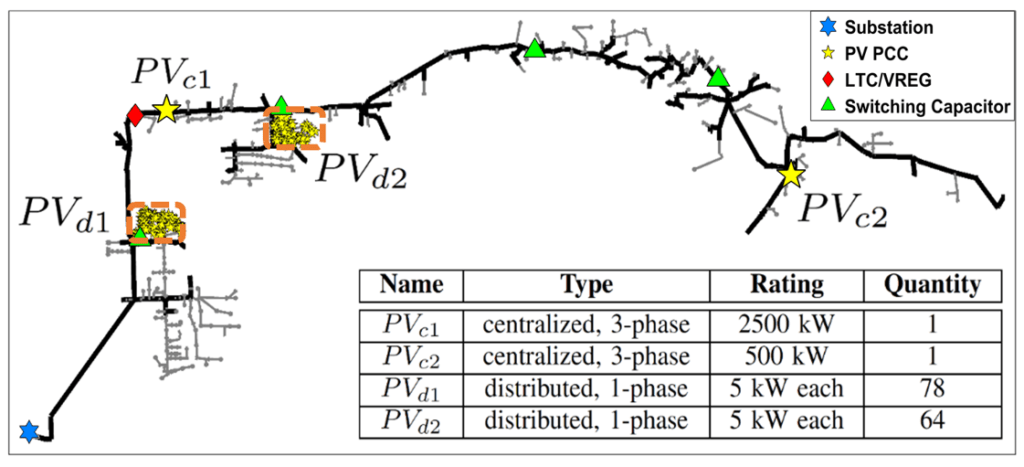 |
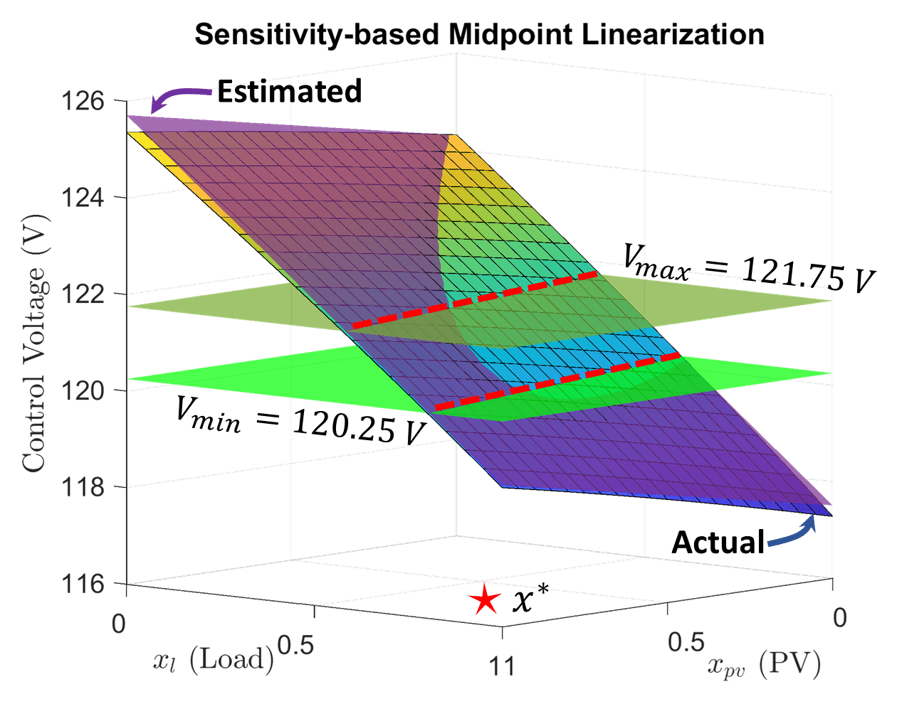 |
| Fig 2.1: PV Hosting Capacity in Large-Scale Distribution Feeders with complex Distributed PV and Voltage Regulating Equipment Models | Fig 2.2 Voltage Manifold Sensitivity for Fast Hosting Capacity |
Selected Publications
- J. Deboever, S. Grijalva, M. Reno, R. Broderick, “Fast Quasi-Static Time-Series (QSTS) for Yearlong PV Impact Studies using Vector Quantization”, Solar Energy Journal, November, 2017.
- M.U. Qureshi, S. Grijalva, M.J. Reno, J. Deboever, X. Zhang and R.J. Broderick, “A Fast, Scalable Quasi-Static Time Series Analysis Method for PV Impact Studies using Linear Sensitivity Model”, IEEE Transactions on Sustainable Energy, Vol 10, No. 1 Jan, 2019.
- S. Grijalva, A. Visnesky, “Assessment of Distributed Generation Programs Based on Transmission Security Benefits”, IASTED-Power and Energy Systems: Distributed Energy and Demand, Clearwater Beach, Florida, USA, November 28-December 1, 2004.
- Q. Sun, M. Cotterell, A. Beach, S. Grijalva, “The Fundamental Value of Information and Strategy in Stochastic Management of Distributed Energy Storage”, in Proceedings of the North American Power Symposium, Champaign, IL, September 9-11, 2012.
- S. Grijalva, A. Visnesky, “The Effect of Generation on Network Security: Spatial Representation, Metrics, and Policy”, IEEE Transactions on Power Systems, Vol. 21, No. 3, pp. 1388-1395, August 2006.
- S. Grijalva, S. Dahman, K. Patten, A. Visnesky, “Large-Scale Integration of Wind Generation Including Network Temporal Security Analysis”, IEEE Transactions on Energy Conversion, Vol. 22, No.1, pp. 181-188, March 2007.
- M. J. Reno, R. J. Broderick, and S. Grijalva, “Smart Inverter Capabilities for Mitigating Over-Voltage on Distribution Systems with High Penetrations of PV”, IEEE Photovoltaic Specialists Conference, Tampa, FL, June 16-21, 2013.(*)
- K. Coogan, M. J. Reno, and S. Grijalva, “Locational Dependence of PV Hosting Capacity Correlated with Feeder Load,” in IEEE PES Transmission & Distribution Conference & Exposition, Chicago, IL, April 2014.
- J. Seuss, M. J. Reno, R. J. Broderick, and R. G. Harley, “Evaluation of Reactive Power Control Capabilities of Residential PV in an Unbalanced Distribution Feeder,” in IEEE Photovoltaic Specialists Conference, Denver, Colorado, June 8-13, 2014.
- M. J. Reno, K. Coogan, J. Peppanen, and S. Grijalva, “Using Distribution LMP and Time-of-Delivery Pricing to Promote Optimal Placement and Increased Profitability of Residential PV Systems,” North American Power Symposium, Washington State University, Pullman, Washington September 7-9, 2014.
- J. Seuss, M. Reno, M. Lave, R. Broderick, S. Grijalva, “Advanced Inverter Controls to Dispatch Distributed PV Systems”, IEEE 43rd Photovoltaic Specialists Conference (PVSC), June 5-10, 2016.
- X. Zhang, S. Grijalva, M. Reno, J. Deboever, R. Broderick, “A Fast, Quasi-Static Time Series (QSTS) Simulation Method for PV Impact Studies Using Voltage Sensitivities of Controllable Elements”, IEEE PV Specialists Conference, Washington DC, June 25-30, 2017
- J. Deboever, S. Grijalva, M.J. Reno, R.J. Broderick, “Algorithms to Effectively Quantize Scenarios for PV Impact Analysis using QSTS Simulation”, 2018 IEEE 7th World Conference on Photovoltaic Energy Conversion (WCPEC), Waikoloa, HI, June 10-15, 2018.
- M.U. Qureshi, S. Grijalva, M.J. Reno, “Fast Quasi-Static Time Series Simulation Method for PV Smart Inverters with VAR Control using Linear Sensitivity Model”, IEEE 7th World Conference on Photovoltaic Energy Conversion (WCPEC), Waikoloa, HI, June 10-15, 2018.
- J. Deboever, S. Grijalva, J. Peppanen, M. Rylander, J. Smith, “Practical Data-Driven Methods to Improve the Accuracy and Detail of Hosting Capacity Analysis”, IEEE 7th World Conference on Photovoltaic Energy Conversion (WCPEC), Waikoloa, HI, June 10-15, 2018.
- D. Diaz, A. Kumar, J. Deboever, S. Grijalva, J. Peppanen, M. Rylander, J. Smith, “Scenario Selection for Hosting Capacity Analysis of Distribution Feeders with Voltage Regulation Equipment”, IEEE Innovative Smart Grid Technologies (ISGT), Washington, DC, February 17-20. 2019.
- U. Qureshi, S. Grijalva, M. J. Reno, “A Rapid Quasi-Static Time Series Method for Evaluating Current-Related Distributed PV Impacts including Feeder Loading and Line Losses”, IEEE PES General Meeting, Atlanta, GA, August 4-8, 2019.
- M. U. Qureshi, A. Kumar, S. Grijalva, J. Deboever, J. Peppanen, M. Rylander, “Fast Hosting Capacity Analysis Considering Over-Voltage Criteria and Impact of Regulating Devices”, IEEE PES Transmission and Distribution Conference and Exposition (T&D 2020), Chicago, April 20-25, 2020.
3. Energy Storage and DER Valuation
Energy storage systems can provide a wide range of services and benefits to the entire value chain of the electricity industry and are becoming a favorable technology among stakeholders. Federal and states’ initiatives mandate energy storage deployment goals as part of their grid modernization roadmap. Because of the significant potential value of energy storage as well as the complexity of the decision-making problem, sophisticated service evaluation methodologies and service optimization tools are explored. We focus on operational strategies for energy storage coupled with renewable energy sources and the privately-owned energy storage system benefits and business models. We propose novel service evaluation methodologies to discover the maximum value of energy storage systems for single and multi-service applications.
 |
| Fig 3: Optimization-Based Energy Storage Valuations Processes and Services Stacking |
Selected Publications
- J. Deboever, S. Grijalva, “Optimal Scheduling of Large-Scale Price-Maker Energy Storage”, IEEE Power and Energy Conference at Illinois, Champaign, IL, February 18-20, 2016
- J. Deboever, S. Grijalva, “Energy Storage Dispatch under Different Ownership and Control Models,” in IEEE PES General Meeting, Chicago, IL, July 16-20, 2017.
- S. Vejdan, S. Grijalva, “Analysis of Multiple Revenue Streams for Privately-Owned Energy Storage Systems” IEEE Power and Energy Conference at Illinois, Champaign, IL, February 22-23, 2018.
- S. Vejdan, S. Grijalva, “The expected revenue of energy storage from energy arbitrage service based on realistic market data statistics,” Texas Power and Energy Conference, College Station, TX, February 8-9, 2018. (*)
- S. Vejdan, S. Grijalva, “The value of real-time energy arbitrage with energy storage systems,” IEEE PES General Meeting, Portland, OR, August 5-10, 2018.
- S. Vejdan, A. Kline, M. Totri, S. Grijalva, and R. Simmons, “Behind-the-Meter Energy Storage: Economic Assessment and System Impacts in Georgia”, 51st North American Power Symposium (NAPS), Wichita, Kansas, October 13-15, 2019.
4. Cyber-Physical Grid Security
The electricity grid is a cyber-physical system (CPS), where the physical electrical aspects of operation and control and the cyber aspects (communication, information, and computation) are closely linked. Cyber-Physical Security deals with the integrated analysis of cyber-attacks and their impact on the physical operation of the grid. We use federated co-simulation of power and communications systems in order to capture the interplay between physical and cyber aspects. We study attacks on the grid that are cyber-originated, the corresponding attack graphs, and attack propagation for realistic systems. We utilize Markov chain models for attack propagation, as well as game-theoretical approaches.
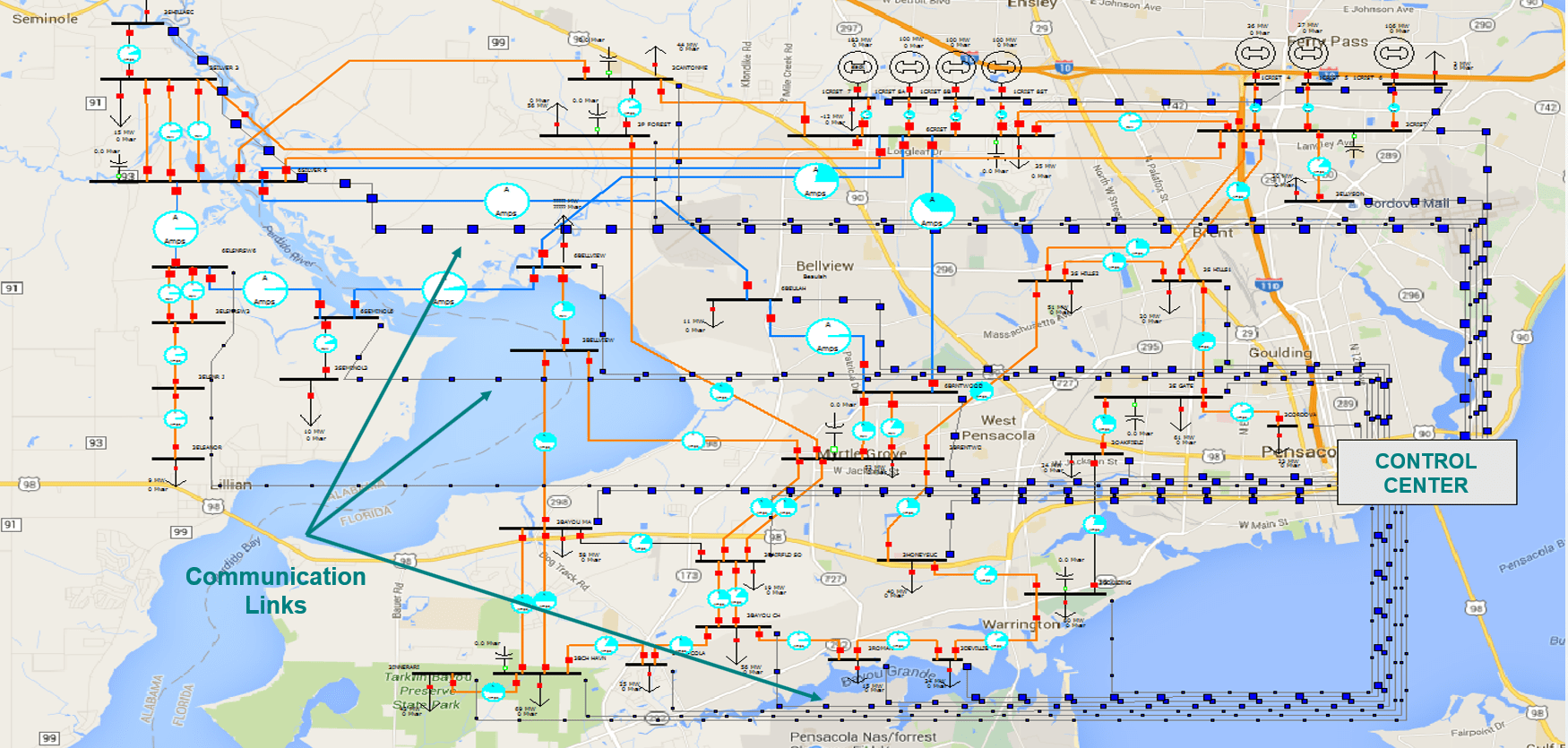 |
Fig 4: Co-Simulation of Power and Communication Systems enables integrated simulation of cyber-originated attacks on the physical operation of the power grid. |
Selected Publications
- N. Saxena, S. Grijalva, N. Chaudhari, “Authentication Protocol for IoT-Enabled LTE Network”, ACM Transactions on Internet Technology (TOIT), Accepted for publication, July, 2016.
- N. Saxena, S. Grijalva, “Dynamic Secrets and Secret Keys Based Scheme for Securing Last Mile Smart Grid Wireless Communication,” IEEE Transactions on Industrial Informatics, Special Issue: New perspectives on wireless communications in automation: From industrial monitoring and control to cyber-physical systems, (SCIE), Vol. 13, No. 3, pp. 1482-1491, 2017.
- N. Saxena, S. Grijalva, “Efficient Signature Scheme for Delivering Authentic Control Commands in the Smart Grid”, IEEE Transactions on Smart Grid, Accepted, January, 2017
- N. Saxena, V. Chuckwuka, L. Xiong, S. Grijalva, “Impact Evaluation of Malicious Control Commands in Cyber-Physical Smart Grids”, IEEE Transactions on Sustainable Computing, Accepted, October, 2018, RE: TSUSC-2017-10-0108.R1.
- N. Saxena, S. Grijalva, “Efficient Signature scheme for delivering authentic control commands in the Smart Grid”, IEEE Transactions on Smart Grid, Vol 9. No. 5, pp. 4323-4334, 2018.
- M. U. Tariq, B. P. Swenson, A. P. Narasimhan, S. Grijalva, G. F. Riley, M. Wolf, “Cyber-Physical Co-Simulation of Smart Grid Applications using ns-3,” in Workshop on ns-3 (WNS3), Atlanta, GA, May 7,2014. (*)
- V. Chukwuka, M. Nazari, S. Grijalva, “Enhancing Communications Reliability in Prosumer-Based Smart Grid using MIMO Techniques”, Clemson University Power Systems Conference, Clemson, SC, March 8-11, 2016.
- N. Saxena, B. J. Choi, S. Grijalva, “Securing Privacy-Preserved Concentration of Metering Data in AMI Networks,” IEEE International Conference on Communications, May 21-25, 2017 Paris, France. (*)
- N. Saxena, V. Chukwuka, S. Grijalva, “Network Security and Privacy Challenges in Smart Vehicle to Grid, IEEE Wireless Communications, Volume: 24, Issue: 4, August, 2017.
- N. Saxena, V. Chukwuka, L. Xiong, and S. Grijalva. “CPSA: A Cyber-Physical Security Assessment Tool for Situational Awareness in Smart Grid.” ACM CCS Workshop (CPS-SPC), Dallas, TX, November 2017.
- N. Saxena, S. Grijalva, B. J. Choi, “Securing Real-Time Publisher/Subscriber Communications in Distributed Substation of the Smart Grid System,” IEEE COMSNETS 2018, Bengaluru, India, January 3-7, 2018.
- V. Chukwuka, Y. Chen, S. Grijalva, V. Mooney, “Bad Data Injection Attack Propagation in Cyber-Physical Power Delivery Systems”, Clemson University Power System Conference, Charleston, SC, September 4th-7th, 2018.
- Y. Cheng, T. Gieseking, D. Campbell, V. Mooney, S. Grijalva, “A Hybrid Attack Model for Cyber-Physical Security Assessment in Electricity Grid”, Texas Power and Energy Conference (TPEC), College Station, TX, February 7-8, 2019.
- Y. Cheng, D. Campbell, V. Mooney. S. Grijalva, B. Eames. A. Outkin, E. Vugrin, R. Helinkski, “Power Grid Bad Data Injection Attack Modeling in PRESTIGE”, Annual GOMACTech: Artificial Intelligence & Cyber Security: Challenges and Opportunities for the Government, Albuquerque, NM, March 25-28, 2019.
- L. Xiong, S. Grijalva, “N-1 RTU Cyber-Physical Security Assessment Using State Estimation”, IEEE PES General Meeting, Atlanta, GA, August 4-8, 2019.
- Y. Chen, T. Gieseking, D. Mooeny, S. Grijlava, “A Hybrid Attack Model for Cyber-Physical A Hybrid Attack Model for Cyber-Physical Security Assessment in Electricity Grid”, – IFIP/IEEE 27th International Conference on Very Large-Scale Integration (VLSI-SoC), El Cuzco, Peru, October 6-9, 2019.
5. Machine Learning and Artificial Intelligence for the Grid
Massive deployment of advanced sensors at all levels of the electricity infrastructure is producing large amounts of data streams that contain tremendous scientific value. We address the challenges of synthesizing and assimilating complex multivariate and spatio-temporal big data for emerging power systems applications. We develop machine learning and AI applications for grid analytics. We focus on machine learning techniques for identification, estimation, and calibration of DER-based systems, mostly at the distribution level. We utilize various machine learning methods most notably neural networks. We investigate AI applications based on visualization learning for grid operational applications.
 |
|
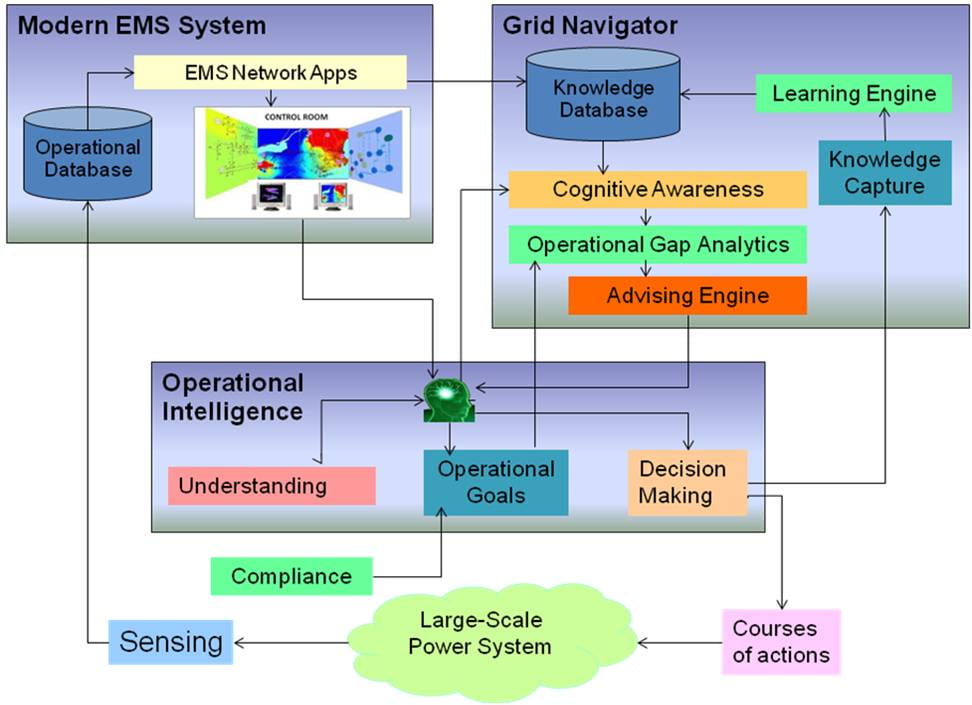 |
|
| Fig 5: Top: Various data sources relevant to smart grid data analytics and an example of a classification algorithm. Bottom Left: Framework for Grid Operational Intelligence. Bottom Right: Dynamic Visualization for Network Security Learning Visualization. |
|
Selected Publications
- Z. Wu, S. Grijalva, “Electric Power Asset Monitoring and Danger Detection using Classified-Feature Awareness”, Journal of Pervasive Technology, Vol. 1., No. 1, March 2012.
- J. Peppanen, M.J. Reno, M. Thakkar, S. Grijalva, R.G. Harley, “Leveraging AMI Data for Distribution System Model Calibration and Situational Awareness”, IEEE Transactions on Smart Grid, Vol. 6, No. 4, pp. 2050-2059, Jan. 2015.
- J. Peppanen, M. J. Reno, R. Broderick, and S. Grijalva, “Distribution System Model Calibration with Big Data from AMI and PV Inverters,” IEEE Transactions on Smart Grid, Vol. 1, No. 99, pp 1-10, March 2016.
- X. Zhang, S. Grijalva, “A Data Driven Approach for Detection and Estimation of Unauthorized Residential PV Installations”, IEEE Transactions on Smart Grid, Vol. 1, No. 99, pp 1-10, April 2016.
- Y. Seyedi, H. Kulkarni, S. Grijalva, “Irregularity Detection in Output Power of Distributed Energy Resources Using PMU Data Analytics in Smart Grids”, IEEE Transactions on Industrial Informatics, Vol. 4, pp. 2222-2232, April, 2019, DOI: 10.1109/TII.2018.2865765
- K. Mason, S. Grijalva, “A Review of Reinforcement Learning for Autonomous Building Energy Management”, Elsevier, Computers and Electrical Engineering, Submitted, November, 2018.
- K. Mason, S. Vejdan, S. Grijalva, “An “On-The-Fly” Framework for Efficiently Generating Synthetic Big Data Sets”, ACM, February 2019, R1.
- K. Mason, S. Grijalva, “Building HVAC Control via Neural Networks and Natural Evolution Strategies”, Elsevier, Energy and Buildings, Accepted, R1, August, 2019.
- S. Vejdan, K. Mason, M. Reno, S. Grijalva, “Detecting Behind-the-Meter PV Installation Using Convolutional Neural Networks”, Journal of Photovoltaics, Submitted, July, 2019.
- J. Peppanen, J. Grimaldo, M. J. Reno, S. Grijalva, and R. Harley, “Modeling of Distribution Systems with Extensive Deployment of Smart Meters,” IEEE PES General Meeting, Washington DC., July 27-31, 2014.
- X. Zhang, S. Grijalva, and M. J. Reno, “A Time-Variant Load Model Based on Smart Meter Data Mining,” IEEE PES General Meeting, Washington DC, July 27-31, 2014.
- X. Zhang, S. Grijalva, “An Advanced Data Driven Model for Residential Plug-in Hybrid Electric Vehicle Charging Demand,” IEEE PES 2015 General Meeting, Denver, CO, July 26-30, 2015.
- J. Peppanen, M. J. Reno, R. Broderick, and S. Grijalva, “Distribution System Low-Voltage Circuit Topology Estimation using Smart Metering Data,” in IEEE PES T&D Conference & Exposition, Dallas, TX, May 2-5, 2016.
- J. Peppanen, M. J. Reno, R. Broderick, and S. Grijalva, “Secondary Circuit Model Generation Using Limited PV Measurements and Parameter Estimation,” IEEE PES General Meeting, Boston, MA, USA, July 17-21, 2016 (*).
- J. Peppanen, S. Grijalva, M. Reno, R. Broderick, “Secondary Circuit Model Generation and Validation with Partial AMI and Transformer Measurements”, 2016 North American Power System Symposium, NAPS, Denver, CO, September 18-20, 2016.
- J. Peppanen, X. Zhang, S. Grijalva, M. Reno, “Handling Bad or Missing Smart Meter Data through Advanced Data Imputation”, IEEE Innovative Smart Grid Technologies (ISGT), Minneapolis, MN, September 6-9, 2016.
6. Electricity Economics and Business Models
ACES conducts research on emerging aspects of electricity economics, markets and business models. This includes: a) Economic theory of prosumers, b) Planning in systems with high penetrations of DER, c) Valuation of DERs as part of non-wires alternatives (NWA) and DER portfolios, d) Impact of smart grid and DERs in utility business models, and e) Techno-economic assessment of the value of novel grid technologies, such as flow routers, DC microgrids, and ultra-fast circuit breakers. We use advanced optimization techniques for optimal energy scheduling, and decomposition methods for long-term investment decisions.
 |
| Fig 6: Multi-Level Interactive Markets including ISO, DSO, and Prosumer Markets |
Selected Publications
- J. Liang, S. Grijalva, R. Harley, “Increased Wind Revenue and System Security by Trading Wind Power in Energy and Regulation Reserve Markets”, IEEE Transactions on Sustainable Energy, Vol. 2, No. 3, pp. 340-347, February 2013.
- L. Du, S. Grijalva, R. Harley, “Game-Theoretic Formulation of Power Dispatch with Guaranteed Convergence and Prioritized Best Response”, IEEE Transactions on Sustainable Energy, Vol. 6, No. 1, pp. 51-59, October 2014.
- M. Sandoval, S. Grijalva, “Electric Vehicle-Intelligent Energy Management System (EV-IEMS) for Frequency Regulation Application”, 2012 IEEE Transportation Electrification Conference and Expo (ITEC), Dearborn, MI, June 18-20, 2012.
- L. Du, S. Grijalva, R. Harley, “Potential Game-Theoretical Formulation of Optimal Power Flow Problems”, IEEE PES General Meeting, San Diego, CA, July 22-26, 2012.
- Q. Sun, S. Grijalva, “Integrated Risk Management for Renewable Energy Investment over Life Cycle”, in Proceedings of the 2012 IEEE Energy Conversion Congress and Exposition (ECCE), Raleigh, NC, September 15-20, 2012.
- Q. Sun, M. Cotterell, A. Beach, Z. Wu., S. Grijalva, “An Economic Model for Distributed Energy Prosumer”, in Proceedings of the 46th HICCS Hawaii International Conference on System Sciences, Hawaii, January 4-7, 2013.
- M. Sandoval, S. Grijalva, “An Assessment on the Impacts of Photovoltaic Systems on Operational Costs of the Grid – The Case of the State of Georgia”, IEEE PES Innovative Smart Grid Technologies Latin America (ISGT LA), Sao Paulo, Brazil, April 15-17, 2013.
- M. Sandoval, S. Grijalva, “Future Grid Business Model Innovation: Distributed Energy Resources Services Platform for Renewable Energy Integration,” 2015 Asia-Pacific Conference in Computer Aided System Engineering (APCASE), Quito, Ecuador, July 14-16, 2015.
- M. Sandoval, S. Grijalva, “Future Grid Business Model Innovation: A Prosumer-Based Cost-Benefit Framework for Valuation of Distributed Energy Resources,” 2015 Innovative Smart Grid Technologies-Latin America, Montevideo, Uruguay, October 5-7, 2015.
- S. Vejdan, S. Grijalva, “Maximizing the Revenue of Energy Storage Participants in Day-Ahead and Real-Time Markets”, Clemson University Power System Conference, Charleston, SC, September 4th-7th, 2018.
- E. Tsybina, S. Grijalva, J. Moreno-Cruz, “A Fundamental Economic Model of Interacting Electricity Prosumers”, North American Power Symposium (NAPS), Fargo, ND, September 9-11, 2018.
7. Home Energy Management
This research addresses the strategies to achieve optimal energy management of a residential customers. We address the problem of day-ahead energy scheduling including curtailable solar, schedulable energy storage, controllable and non-controllable appliances, and electric vehicles. Advanced optimization techniques are utilized to determine optimal DER and appliance operations. User-friendly human-machine interfaces are designed and controller prototypes are developed using IoT.
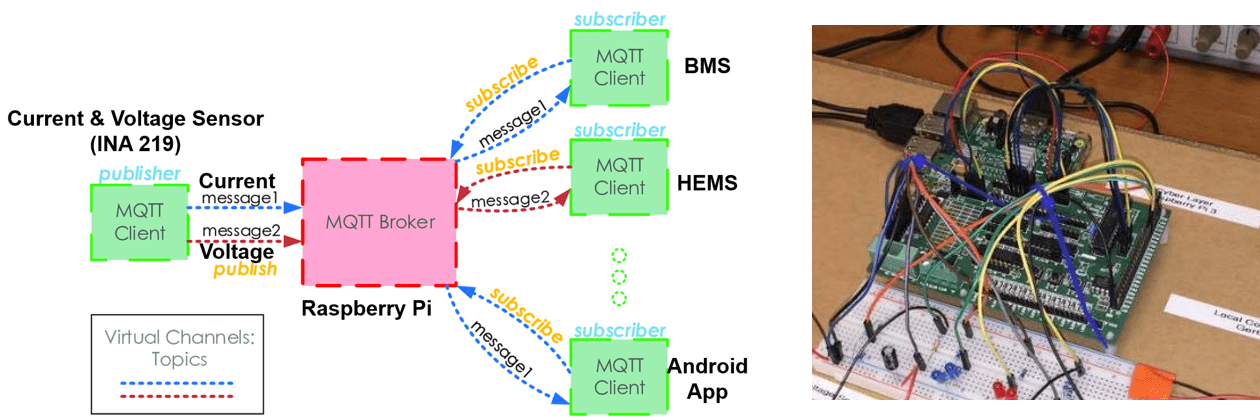 |
Fig 7: Home Energy Management System Technologies |
Selected Publications
- T. Hubert, S. Grijalva, “Modeling for Residential Electricity Optimization in Dynamic Pricing Environments”, IEEE Transactions on Smart Grid, Special Issue on Intelligent Buildings and Home Energy Management, Vol. 3. No. 4, pp 2224-2231, December 2012.
- Q. Sun, S. Grijalva, “Price-Based Energy Home Device Scheduling”, Intelligent Power Infrastructure Consortium (IPIC) Smart Grid Workshop, Atlanta, Georgia, November 16-17, 2009.
- T. Hubert, S. Grijalva, “Home Energy Manager: A Consumer-Oriented Interactive Tool to Optimize Energy Use”, IEEE International Conference on Consumer Electronics (ICCE), Las Vegas, Nevada, USA, January 9-12, 2011.
- T. Hubert, S. Grijalva, “Realizing Smart Grid Benefits Requires Energy Optimization Algorithms at Residential Level”, IEEE Conference on Innovative Smart Grid Technologies (ISGT), Anaheim, California, January 17-19, 2011.
- J. Peppanen, M. Reno, S. Grijalva, “Thermal Energy Storage for Air Conditioning as an Enabler of Residential Demand Response”, 2014 North American Power Symposium, Washington State University, Pullman, Washington September 7-9, 2014.
- M.U. Qureshi, A. Girault, M. Mauger, S. Grijalva, “Implementation of Home Energy Management System with Optimal Load Scheduling based on Real-Time Electricity Pricing Models”, IEEE 7th International Conference on Consumer Electronics (ICCE-Berlin), Berlin, Germany, September 3-6, 2017.
- C. Zhong, J. Sun, J. Xie, S. Grijalva, A.P. Meliopoulos, “Real-Time Human Activity Based Energy Management System using Model Predictive Control”, IEEE International Conference on Consumer Electronics (ICCE), Las Vegas, NV, January, 12-14, 2018.
- A. Kumar, R. Singh, Y. Cai, S. Grijalva, “Smart Home Energy Management System With Optimal Source Selection in a Real-Time Pricing Environment”, IEEE International Conference on Consumer Electronics: “Intelligent Consumer Technologies, Security and Privacy by Design”, Las Vegas, January 4-6, 2019.
8. Microgrids and Grid Resilience
ACES studies methods and technologies needed to improve grid resilience. This includes DER integration, microgrids, and enhanced grid control including inverter-based microgrids. We develop analysis of ultra-reliable energy systems at the microgrid and at the distribution level utilizing novel techniques such as optimization based on locational restoration times, feeder reconfiguration, and microgrid positioning.
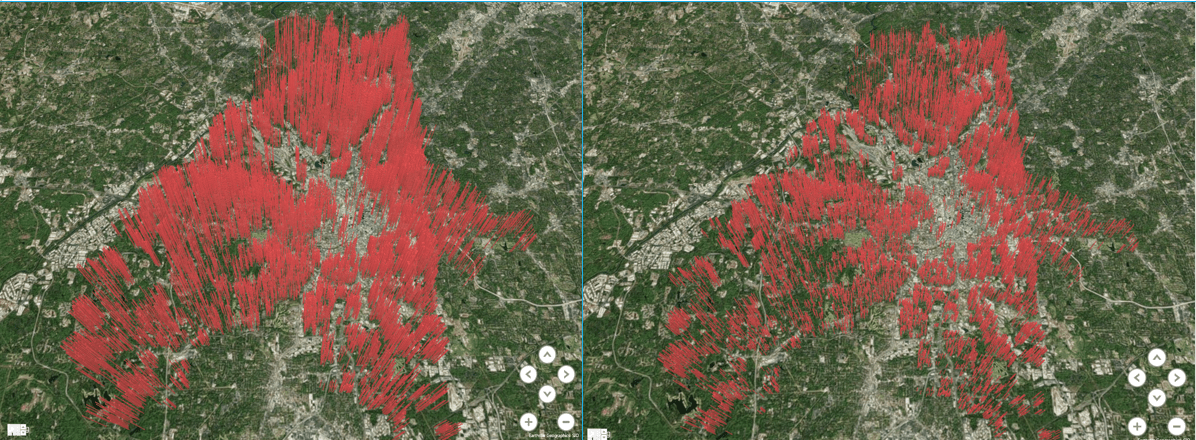 |
| Fig 8: Locational Restoration Times on Distribution Feeder Customers in the City of Atlanta. Left: Baseline, Right: DER-Enhanced System |
Selected Publications
- A. Golani, T. Seyedi, S. Grijalva, “Proactive Management of Microgrids for Resiliency Enhancement: An Adaptive Robust Approach”, IEEE Transactions on Sustainable Energy, Accepted, August, 2017.
- N. Ainsworth, S. Grijalva, “Autonomous Microgrid Control”, Intelligent Power Infrastructure Consortium (IPIC) Smart Grid Workshop, Atlanta, Georgia, November 16-17, 2009.
- N. Ainsworth, M. Costley, J. Thomas, M. Jezierny, S. Grijalva: “Versatile Autonomous Smartgrid Testbed (VAST): A Flexible, Reconfigurable Testbed for Research on Autonomous Control for Critical Electricity Grids”, in Proceedings of the North American Power Symposium, Champaign, IL, September 9-11, 2012.
- X. Zhang, S. Grijalva, “Smart Energy Campus: A Smart Grid Test Bed for Advanced Modeling, Simulation, and Decision-Making,” Tenth Carnegie Mellon Conference on the Electricity Industry, Pittsburg, PA, March 31-April 1, 2015.
- J. Deboever, S. Grijalva, “Modeling and Optimal Scheduling of Integrated Thermal and Electrical Energy Microgrid”, 2016 North American Power System Symposium, NAPS, Denver, CO, September 18-20, 2016.
- R. Jamshad, M.U. Qureshi, S. Grijalva, “Geographic Information Systems (GIS) Image Analysis for Prioritizing Power System Restoration”, Clemson University Power System Conference, Charleston, SC, September 4th-7th, 2018. (*)
- A. Kumar, S. Grijalva, “Graph Theory-Based Distribution System Restoration after Natural Disasters Using Microgrids”, Clemson University Power System Conference, Charleston, SC, September 4th-7th, 2018.
- G. M. Ilunga, M. Thompson, O. Obadolagbonyi, S. Grijalva, “Optimal Energy Storage-Grid Coordination for Hospitals: Prototype Development”, 51st North American Power Symposium (NAPS), Wichita, Kansas, October 13-15, 2019.
- A. Cruz, M.G. Rad, C. Irvene, S. Grijalva, “Smart Cable Detach Mechanism with Integrated Emergency Mesh Network”, 51st North American Power Symposium (NAPS), Wichita, Kansas, October 13-15, 2019.
9. Bulk Power System Security and Stability
This research focuses on angle and voltage stability of bulk power systems. We have focused on theoretical work of local metrics for the detection and estimation of proximity to static voltage collapse. We explore the relation between saddle-node bifurcation voltage collapse and complex flow limits of individual transmission elements. Necessary conditions for power system voltage collapse are derived. While collapse phenomena depend on the conditions of the entire network, topological methods are promising alternatives providing mechanisms to monitor voltage collapse by looking at the behavior of the flow of active and reactive power in individual transmission elements. Our work on security has also focused on transfer capability and methods to incorporate power electronics devices into functions such as Optimal Power Flow (OPF). Our work on angle stability has focused on a) decentralized method for improved frequency response, b) dynamics of multi-area stability using energy functions, and c) stability of microgrids and DER-based prosumer systems such as systems with inertia-less sources.
 |
| Fig 9: Bulk Power Security. Illustration of US Grid Interconnection and ISO Bulk Power Control Room. |
Selected Publications
- A. Roy, S. Grijalva, “Automated Handling of Arbitrary Switching Device Topologies in Planning Contingency Analysis: Towards Temporal Interoperability in Network Security Assessment”, IEEE Transactions on Power Systems, Vol. 28, No. 2, pp. 1523-1530, September, 2012.
- J.J. Thomas, S. Grijalva, “Flexible Security Constrained Optimal Power Flow”, IEEE Transactions on Power Systems, Vol. 30, No. 3, pp. 1195-1202, August 2014.
- X. Zhang, S. Grijalva, “Decentralized Total Transfer Capability Evaluation using Domain Decomposition Methods”, IEEE Transactions on Power Systems, Vol. pp, No. 99, pp. 1-9, October 2015.
- M. Mehrabankhomartash, M. Saeedifard, S. Grijalva, “Model Predictive Control-Based Thermal Overload Alleviation in Meshed AC/MTDC Grids”, IEEE Transactions on Power Systems, Submitted, November, 2018.
- M. Kezunovic, S. Grijalva, A. Roy, P. Dutta, “The Fundamental Concept of Unified Generalized Model and Data Representation for New Applications in the Future Grid”, Proceedings of the 45th HICCS Hawaii International Conference on System Sciences, Hawaii, January 4-7, 2012.
- M. Costley, S. Grijalva, “Efficient Distributed OPF for De-centralized Power System Operations and Electricity Markets”, IEEE PES Conference on Innovative Smart Grid Technologies, Washington D.C., January 17-19, 2012.
- P. Myrda, S. Grijalva, “The Need for Next Generation Grid Energy Management System”, 2012 CIGRE US National Committee Grid of the Future Symposium, Kansas City, Missouri, October 28-30, 2012.
- X. Zhang, S. Grijalva, “Multi-Area Available Transfer Capability”, IEEE PES General Meeting, Vancouver, Canada, July 21-25, 2013
- M. Kezunovic, L. Xie, S. Grijalva, “The role of big data in improving power system operation and protection”, IREP, Bulk Power System Dynamics and Control – IX Optimization, Security and Control of the Emerging Power Grid, Rethymno, Greece, August 25-30, 2013.
- J. Thomas, J. Hernandez, S. Grijalva, “Power Flow Router Sensitivities for Post-Contingency Corrective Control”, in Proceedings of the 2013 IEEE Energy Conversion Congress & Exposition, Denver, CO, September 15-19, 2013.
- J. E. Hernandez, R. P. Kandula, F. Lambert, D. Divan, and S. Grijalva, “A 7.2 kV experimental setup of a third harmonic hybrid active filter for medium voltage utility applications,” in Proceedings of the IEEE Energy Conversion Congress & Exposition, Denver, CO, September 15-19, 2013.
- J.J. Thomas, S. Grijalva, “Increasing Transmission Capacity Utilization Using Power Flow Routers”, IEEE PES T&D Conference and Exposition, Chicago, IL, April 14-17, 2014.
- J.J. Thomas, J.E. Hernandez, and S. Grijalva, “An Investigation of the Impact of Dispatchable Power Routers on Electricity Markets and Market Participants,” IEEE PES General Meeting, Washington DC, July 2014.
- G. Rivera, S. Grijalva, “Generalized State Estimation (GSE) with Applications to the National Interconnected System”, CENACE Electricity, December 2015.
- L. Farinango, S. Grijalva, “Parametric Sate Estimation for Real-Time and Off-Line Model Tuning”, CENACE Electricity, December 2015.
- R. Pienta, L. Xiong, S. Grijalva, D. Chau, “STEPS: A Spatio-temporal Electric Power Systems Visualization”, IUI 2016 Conference, Sonoma, CA, March 7-10, 2016.
- X. Zhang, J. James, S. Grijalva. “Fast Evaluation of Probabilistic Total Transfer Capability Considering Multiple Wind Farms,” IEEE PES T&D Conference, Dallas, TX, May 2-5, 2016.
- L. Xiong and S. Grijalva, “Fast Decomposition-Based State Estimation Using Automatic Graph Partitioning and ADMM,” IEEE PES General Meeting, Boston, MA, USA, July 17-21, 2016.
- S. Grijalva, L. Xiong, S. Vejdan, “Resilience Analysis of Modular Controllable Transformers (MCTs), Texas Power and Energy Conference, College Station, TX, February 8-9, 2018.


